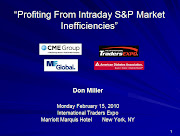Some random thoughts on this Sunday morning.
Still Searching - I thought I'd check out other traders' blogs this morning, specifically looking for traders posting recaps of their daily thought processes, trading results, or similar info. (A brief experiment of curiosity only as I can't ever let others influence how I trade.) So I Google'd several variations of "S&P Trader Blogs", scrolled through a few search screens, and found zilch. What I did find was a mix of sites containing (1) analysis paralysis, (2) "buy my service and pay me money", and (3) outdated/dead material ... one with the last post from 2005! As I said in yesterday's video ... lots of picks and shovels (some with a stone tied to a stick), but no gold.
So where are all of the real traders? The obvious answer is well-hidden (this site didn't even come up unless you added my name) and purposely unpublicized. The market may be a zero-sum game, but it's still the tiny silent minority who build their chip stacks from the large majority. And it's silence that remains golden. btw, I've received several requests from vendors to add advertising to this blog ... I remain steadfast that I'm not going there. Some don't get it that this is a diary!!
Next time you're at a trading convention, find that quiet unassuming person grinning in the corner and ask to buy him dinner. You may find it the best $50 you ever invested.
Early Writings - At the request of some, I've posted a few direct links to interviews and publishings from my earlier years in the lower left hand corner. Keep in mind some of the very early material reflects my pre-S&P trading days when I traded stocks and ETFs. The S&C feature interview link only contains an excerpt from the article due to copyright rules. As I've mentioned, I purposely remained off the grid for a few years and have shied away from interviews to maintain my privacy, sanity, and -- most importantly -- my humility.
2009 Plans - Some have asked me what my 2009 plans are. Huh?? I don't even know what Monday morning's plans are. I really have no clue as my only focus is on the 2008 race, I still need to catch the French guy splashing water in my face to the right, and time is ticking down.
Short Stacked - Retooling the site this weekend has been fun, but it's back to work on Monday with shovel in hand. I again start in a massive hole and need to scratch, claw, and dig my way out. At least the shovel may be good for one thing! By tomorrow morning, I need to have that sickening pit in my stomach that follows a huge draw. I'm short stacked, the pressure is on, and I can't fall any further behind.
Quote for the Day - "It's not that I'm just smart, I just stay with problems longer." Albert Einstein (1879-1955)
Enjoy the rest of your weekend.
Sunday, September 14, 2008
Subscribe to:
Post Comments (Atom)
















8 comments:
Hi Don:
Love this diary blog/ site. I find that when you write your thoughts and reviews, it will accelerate your learning. BTW, I am reading Gus Hansen's new book. It is quite good. I recommend it.
RONIN
used to read you on trading markets- like your style. still have the 70's stache i see. ive added your blog to my list- keep up the great posts. love tao of poker as well
p
Don -
I knew I would get your attention on this one. OK I clearly see the connection between poker and trading. Size management and pressing the advantage with odds. But The Texas Hold'Em tournament game is where the connection between poker and trading breaks down for me.
(Please note my experience with Texas Hold'Em is limited to a computer applet that comes with the Vista Operating System)
There seems to be two distinct games within Texas Hold'Em tournament. (1) There is the beginning poker game - which I completely get and excel at. However as a few players drop out of the game - (2) the blinds get bigger and those players who built an initial chip advantage built in the earlier game - now begin to play a war of attrition and bluffing predominately wins.
It seems that the poker/trading skills that are very similar in the 1st part of the game are really turned on its head in the "2nd part" of the game - this is where money management rules seems to go out the window.
The Texas Hold'Em tournament seems only to get back to a normal when the chip values are approximately equal between two players in the 2nd part ofthe game.
Also the whole notion of increasing blinds in the later part of the game, doesn't seem to apply to size management in trading. As players are usually "forced" to play as the ability to drop hands and only play stronger initial 2 cards becomes very costly in the 2nd part of the game.
Now Atlantic City is a couple hours away, but I have not been in a Casino since the 1980's. Perhaps there the rules are different there. If one is able to drop many hands continuously (size management/scratching marginal trades)- then I think the analogy between poker and trading stands.
Am I incorrect in my observations?
Regards,
J
Hi J.
Interesting question, and I'll do my best to respond -- keeping in mind that I'm still a neophyte in the poker world by most standards and others may have much better responses (go for it folks).
I tend to agree with your observations and believe most of the similarities with trading lie within the poker cash game (vs. tournaments), which most traditionalists still consider to be "true poker".
In cash games of course, the blinds never increase and one can sit patiently for hours with the only "forced" cost being fixed-cost blinds and the casino rake (i.e. $5 per 30 mins at Foxwoods for the $1/$2 game). There, I see the similarities clearly including extreme patience, discipline, and strong money management including risking relatively little to make a lot. Plus, like most electronic markets, cash games are open 24x7 which brings into play energy level, fertile times, discipline, etc.
There's no doubt that tournament games force more aggression -- which as one poster mentioned recently can be an even tougher skill to achieve -- since you can't simply sit back. In a no-limit tournament, your obvious objective is to either get ALL of the chips, or be one of the last standing before losing everything so you can place in the $$. This "all or nothing" objective is clearly not the case in trading, as most 1999-2001 internet stock "geniuses" unfortunately found out the hard way.
[I recently read where Phil Ivey's strategy in tournaments is to either go out early, or go for the win and win only. That's because he wants to keep his energy level high for his cash game which he plays almost every night.]
In terms of bluffing, which plays a part in both types of game, obviously one can't bluff the market -- although I will say if you look carefully at the micro-details of electronic CME trading, you see it all the time.
I feel most of the similarities lie with the mental aspect of poker (both styles) and trading. Both endeavors have suckers at the table, and the key is being on the other side from those making emotional decisions.
Thoughts from here ... others may have better input.
Don
As a tournament and cash game player, the psychology of proper poker thinking ( risk and reward) are very similar to trading. So is the psychology of sports performance... They are all similar but trading has its own characteristics as well. One major difference is that you may not find high odds in BLUFFING the market....
Don,
Would it be possible to post a chart of the daily S&P, with your trades tagged (perhaps, if you want to treat us .. including size)? I, and I am sure others, would find that very helpful in following your blog.
Thanks,
david
Hi David.
That wouldn't be practical for a couple of reasons including my high volume trading style (numerous sequences including risk-managing entries, scratches, re-entries, scaling in/out, liquidity-provding buying on bid selling on ask, etc.) isn't condusive to such a recap. Essentially, it would be completely unreadable and useless (been there, done that).
Plus, as I've referenced many times, this is simply my pesonal trading diary, and I purposely choose not to record and review that level of detail after the day is done to keep my focus and engergy level on a single long-term performance objective. Essentially, once the day is over, the sequences to me are completely forgotten and irrelevant for the next trading day and my "look-back" is limited to notes I scribble as the day unfolded.
Thanks for the ?.
Don
Like the reference to being short stacked. Then you won't piss away chips on marginal situations.
As regard to cash games being "true poker", I try to recognize and rid myself of this type of thinking whenever I think some new development in any activity is not "pure". I just want to recognize it for what it is - a new market and perhaps opportunity. You always hear this from the old guard when something new changes the landscape. Tournament poker is no more "un-true" than using an oversized racket in tennis, shaped skis, or oversized drivers and cavity backed clubs in golf.
(I played cash games for a year before trying a tournament. Now that's almost all I play when I get the chance. I enjoy the changing gears and end play aspect).
Post a Comment